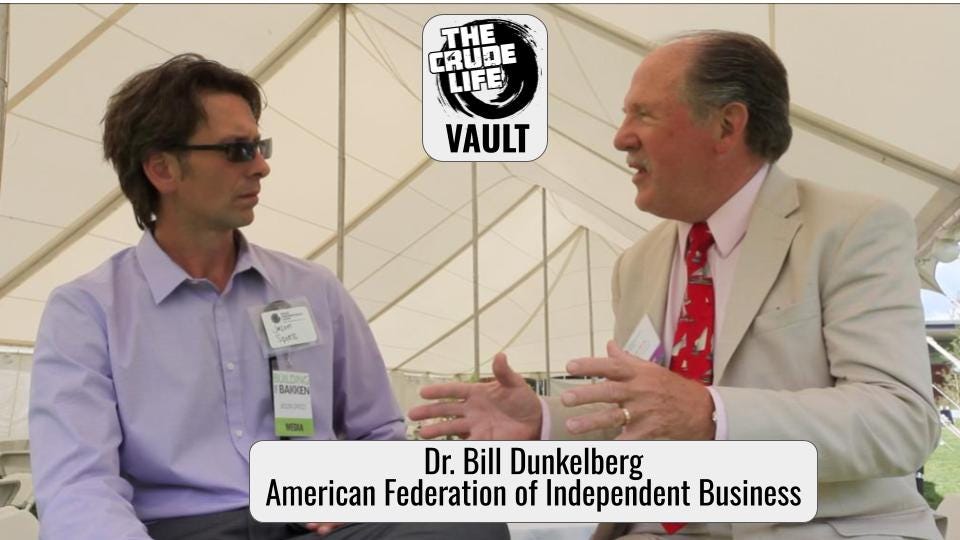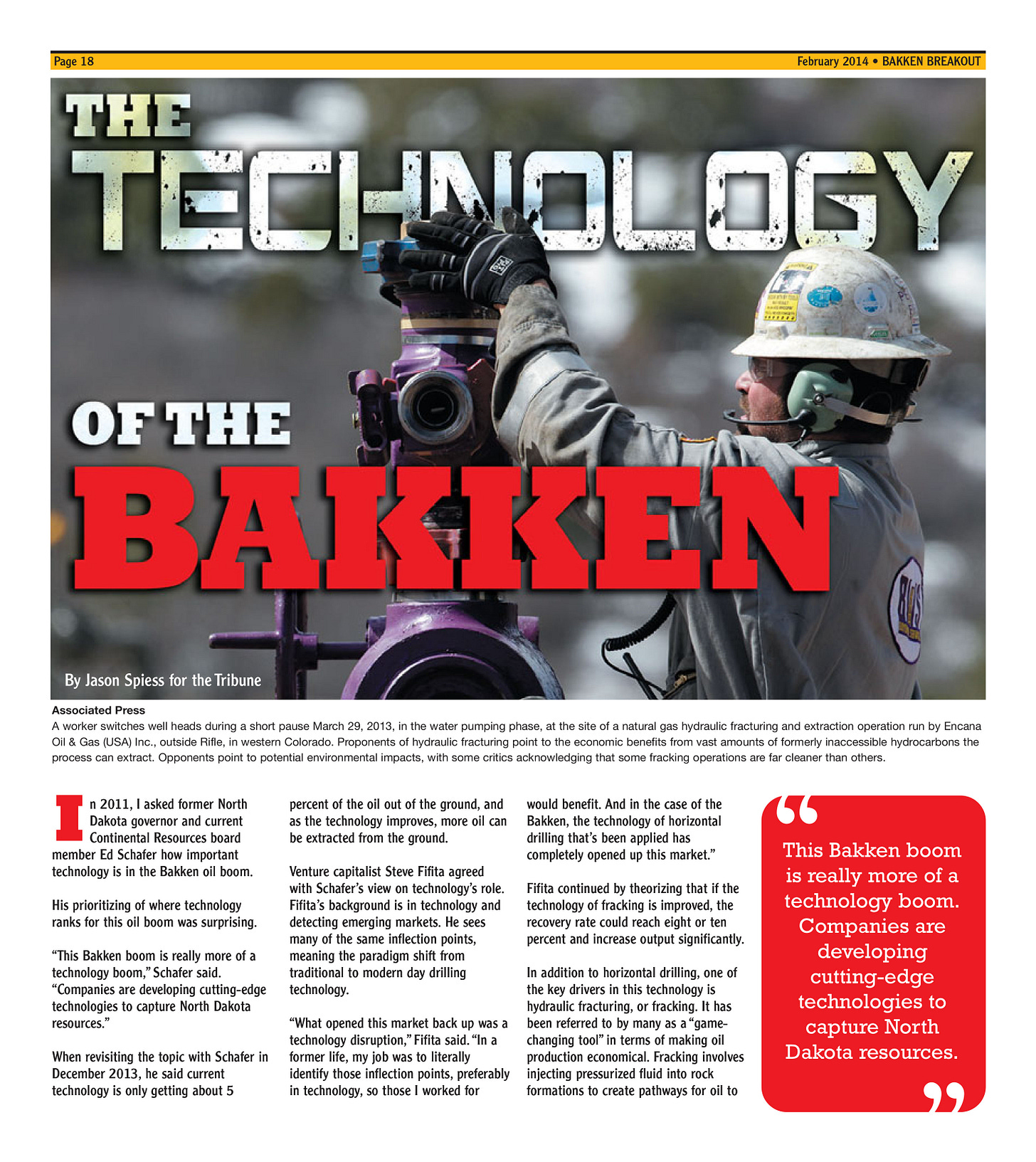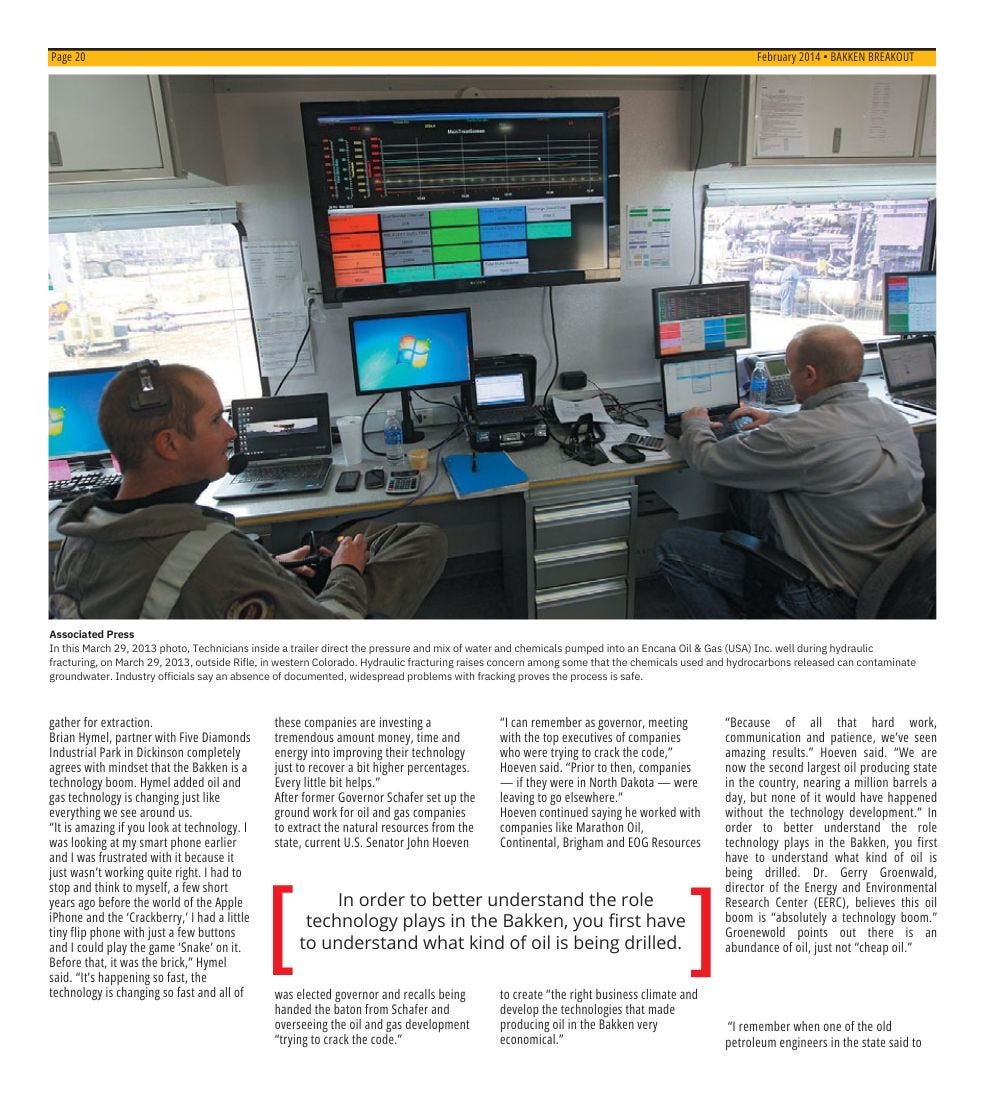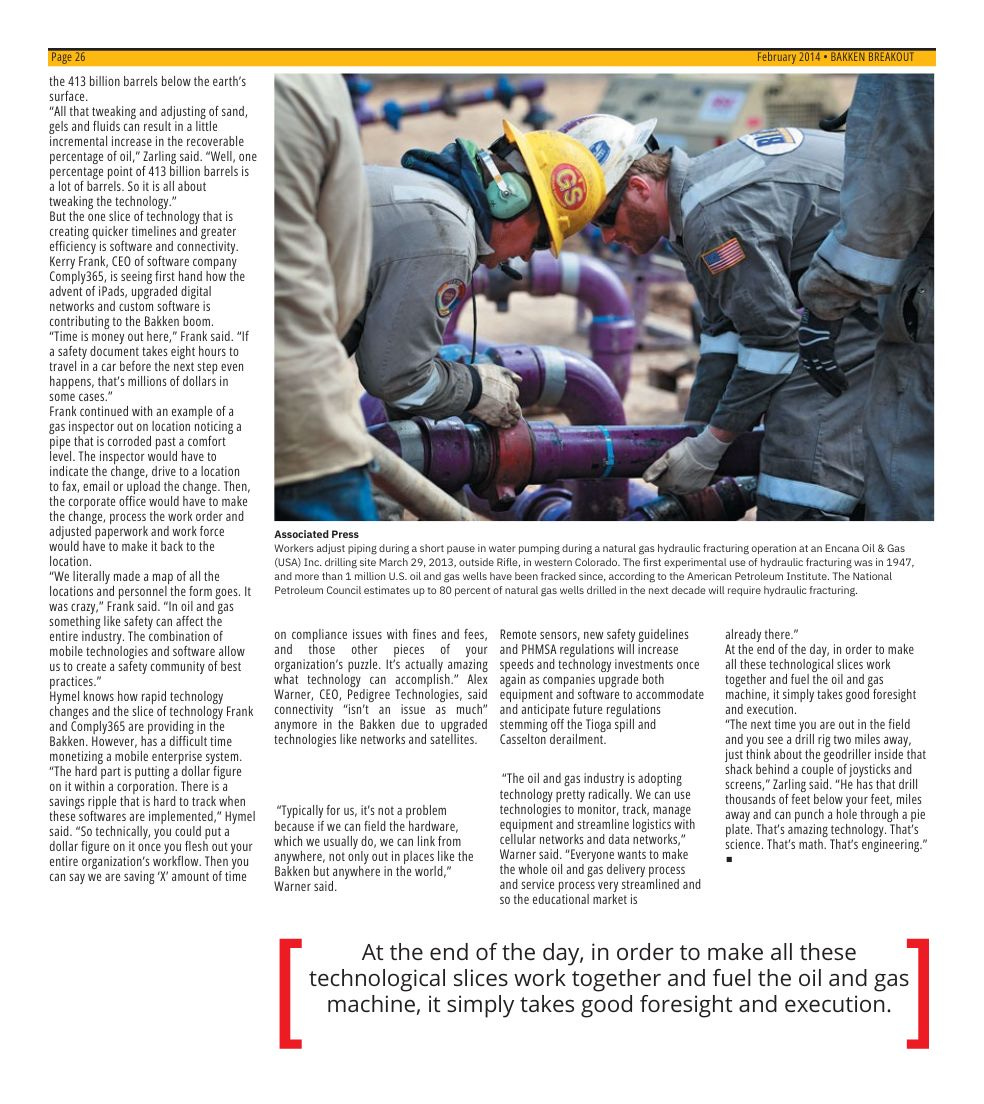
The Crude Life Vault: Dr. Bill Dunkelberg, Chief Economist, National Federation Independent Business from 2013 in Jackson Hole, Wy.
In this episode of The Crude Life Vault, Chief Economist, National Federation Independent Business, Bill Dunkelberg explains why we are in a technology boom and that we are out of "Jed Clampett oil".
Dunkelberg believes the current oil play is more a two-fold tech boom.
"The first is the technology to retrieve the oil through hydraulic fracturing and horizontal drilling. They've been around for awhile, but have been refined," Dunkelberg said. "The second is the investment going into the technology. Once there's money in it, it moves to solves problems. Markets solve problems. Finding out how to get the gas out of the ground and into the market cheaper, faster and more environmentally sound are problems worth solving."
It is technology, however, that got us to the oil in the Bakken and it will be technology that will get us to more of it in the layers below the Bakken such as the Three Forks and beyond. Chemistry is only one type of technology being tweaked in the Bakken. The other technology change pertains to traditional drill rigs.
Back then, Hess and Continental Resources were reporting roughly a 30% savings in pad drilling efficiencies last year (in 2012). Advancements in physical technologies, like drill sites that crawl and longer horizontal drills, are being tested and implemented everyday.
Mr. Dunkelberg is a former Professor of Economics at Temple University, the former Dean of the Fox School of Business, and serves as Chief Economist for the National Federation of Independent Business. He has appeared on CNBC, Bloomberg, CNN, MSNBC, the ABC, CBS and NBC Evening News programs, Good Morning America, and numerous local news and business TV and radio shows.
He is frequently quoted in the Wall Street Journal, Business Week, the New York Times, U.S. News and World Report, USA Today, Time, and Newsweek. He also serves on the economic forecasting panels for USA Today, Business Week and Bloomberg and as an economic consultant to ABC News.
(Feature Article by Jason Spiess from 2013)
The Technology of the Bakken
In 2011, I asked former North Dakota governor and current Continental Resources board member Ed Schafer how important technology is in the Bakken oil boom.
His prioritizing of where technology ranks for this oil boom was surprising.
“This Bakken boom is really more of a technology boom,” Schafer said. “Companies are developing cutting-edge technologies to capture North Dakota resources.”
When revisiting the topic with Schafer in December 2013, he said current technology is only getting about 5% of the oil out of the ground, and as the technology improves, more oil can be extracted from the ground.
Venture capitalist Steve Fifita agreed with Schafer's view on technology's role. Fifita’s background is in technology and detecting emerging markets. He sees many of the same inflection points, meaning the paradigm shift from traditional to modern day drilling technology.
"What opened this market back up was a technology disruption," Fifita said. "In a former life, my job was to literally identify those inflection points, preferably in technology, so those I worked for would benefit. And in the case of the Bakken, the technology of horizontal drilling that's been applied has completely opened up this market."
Fifita continued by theorizing that if the technology of fracking is improved, the recovery rate could reach eight or ten percent and increase output significantly.
In addition to horizontal drilling, one of the key drivers in this technology is hydraulic fracturing, or fracking. It has been referred to by many as a “game-changing tool” in terms of making oil production economical. Fracking involves injecting pressurized fluid into rock formations to create pathways for oil to gather for extraction.
Brian Hymel, partner with Five Diamonds Industrial Park in Dickinson, ND, completely agrees with mindset that the Bakken is a technology boom. Hymel added oil and gas technology is changing just like everything we see around us.
"It is amazing if you look at technology.I was looking at my smart phone earlier and I was frustrated with it because it just wasn’t working quite right. I had to stop and think to myself, a few short years ago before the world of the Apple iPhone and the Crackberry, I had a little tiny flip phone with just a few buttons and I could play the game Snake on it. Before that, it was the brick," Hymel said. "It’s happening so fast, the technology is changing so fast and all of these companies are investing a tremendous amount money, time and energy into improving their technology just to recover a bit higher percentages. Every little bit helps."
After former Governor Schafer set up the ground work for oil and gas companies to extract the natural resources from the state, current US Senator John Hoeven was elected governor and recalls being handed the baton from Schafer and charged with overseeing the oil and gas development "trying to crack the code."
“I can remember as governor, meeting with the top executives of companies who were trying to crack the code," Hoeven said. "Prior to then, companies – if they were in North Dakota – were leaving to go elsewhere."
Hoeven continued saying he worked with companies like Marathon Oil, Continental, Brigham and EOG to create "the right business climate and develop the technologies that made producing oil in the Bakken very economical."
"Because of all that hard work, communication and patience, we’ve seen amazing results." Hoeven said. "We are now the second largest oil producing state in the country, nearing a million barrels a day, but none of it would have happened without the technology development.”
In order to better understand the role technology plays in the Bakken, you first have to understand what kind of oil is being drilled. Dr. Gerry Groenwald, director of the Energy and Environmental Research Center (EERC), believes this oil boom is "absolutely a technology boom." Groenewold points out there is an abundance of oil, just not "cheap oil."
“I remember when one of the old petroleum engineers in the state said to me – this was 25 years ago," Groenewold recalled. "He said, 'I think we’re out of $3 oil Gerry.’ He came into my office about 10 years later and said, ‘Yep, I think we’re out of $15 oil now.’ We are not short on molecules, we are short on recovery rate.”
Chief Economist, National Federation Independent Business, Bill Dunkelberg agrees this is a technology boom and that we are out of "Jed Clampett oil". Dunkelberg believes it is a two-fold tech boom.
"The first is the technology to retrieve the oil through hydraulic fracturing and horizontal drilling. They've been around for awhile, but have been refined," Dunkelberg said. "The second is the investment going into the technology. Once there's money in it, it moves to solves problems. Markets solve problems. Finding out how to get the gas out of the ground and into the market cheaper, faster and more environmentally sound are problems worth solving."
Dr. Groenewold reminds us that the Bakken, as well as other shale plays around the country, really are part of a three-legged stool that not only includes technology and access to vast amounts of oil, but the third, critical leg which is economics.
“As we get to a point where the harder-to-access oil is the only oil left, then the only way we are going to go after that is due to the high price of oil which incentivizes the development of technology to cost-effectively capture that oil. That’s what happened in the Bakken," Groenewold said. "The price went up, we knew it was there, people started investing in technological concepts – it worked – and now we have a major oil play. And it’s the model for the rest of the world with similar oil plays elsewhere. The Bakken is the training ground.”
It is technology, however, that got us to the oil in the Bakken and it will be technology that will get us to more of it in the layers below the Bakken such as the Three Forks and beyond. Chemistry is only one type of technology being tweaked in the Bakken. The other technology change pertains to traditional drill rigs.
Hess and Continental Resources reported roughly a 30% savings in pad drilling efficiencies last year. Advancements in physical technologies, like drill sites that crawl and longer horizontal drills, are being tested and implemented everyday.
The Energy and Environmental Research Center (EERC) is gearing up for a project to change the game yet again.
“We’re constantly enhancing technology every day. We have a new program with the oil industry, with some funding also from the Oil & Gas Research Council. It's going to be a $115 to $120 million project," Groenwald said. "Drilling 14 oil wells in one location. Putting 3 or 4 each in the Bakken, the upper Bakken, the lower Bakken, the Three Forks… But all the horizontal portions will all be in the same direction and we’re going to do some of the most sophisticated geophysical work ever. We’re going to be fracking those wells and we’re going to be down there with geophones listening. With those, we can say which direction the frack went, what the orientation is, how deep, how far it went, etc.”
Joseph Mahan, economist with the Minneapolis Federal Reserve, said the technology boom is an interesting angle, but the Bakken is clearly an oil boom. He went on to say that the "grain of truth" in Schafer’s comments is that technology is clearly driving the access to the oil to create the boom.
"First order of business is that it is an oil boom," Mahan said. "With that said, the combination of the technologies and the price of oil have made it cost effective and profitable to extract oil from the Bakken shale, where it otherwise might not have been, even five or ten years ago. That's really what has made this current oil boom possible. The development of this new technology."
Mahan also added a relatively favorable price of oil for the past decade has contributed to the Bakken success.
"It certainly hasn't hurt that the world price of oil has been at a fairly high plateau for the past five years or so," Mahan said. "That also makes it more cost effective to extract the oil."
Jeff Zarling, Williston resident and founder of Dawa Solutions Group, agrees this modern-day oil boom is definitely different.
“When we explain to people how this oil boom works, they are just fascinated," Zarling said. "They had this idea that oil and gas was just a bunch of roughnecks out there slinging chain and hitting the bars at night. That's not what this is about”.
Zarling continued, saying that Richard Finley "changed the world in 1999" when he applied horizontal drilling and hydraulic fracking in the Elm Coulee Field. Then EOG Resources applied staged fracking to the Parshall Sanish in 2005-2006. Zarling added it is all about tweaking and changing the technologies within the Bakken to reach the 413 billion barrels below the earth’s surface.
"All that tweaking and adjusting of sand, gels and fluids can result in a little incremental increase in the recoverable percentage of oil," Zarling said. "Well, one percentage point of 413 billion barrels is a lot of barrels. So it is all about tweaking the technology."
But the one slice of technology that is creating quicker timelines and greater efficiency is software and connectivity. Kerry Frank, CEO of software company Comply365, is seeing first hand how the advent of iPads, upgraded digital networks and custom software is contributing to the Bakken boom.
"Time is money out here," Frank said. "If a safety document takes eight hours to travel in a car before the next step even happens, that's millions of dollars in some cases."
Frank continued with an example of a gas inspector out on location noticing a pipe that is corroded past a comfort level. The inspector would have to indicate the change, drive to a location to fax, email or upload the change, then the corporate office would have to make the change, process the work order and adjusted paperwork and work force would have to make it back to the location.
"We literally made a map of all the locations and personnel the form goes. It was crazy," Frank said. "In oil and gas something like safety can affect the entire industry. The combination of mobile technologies and software allow us to create a safety community of best practices."
Hymel knows the slice of technology Frank and Comply365 are providing in the Bakken, however has a difficult time monetizing a mobile enterprise system.
"The hard part is putting a dollar figure on it within a corporation. There is a savings ripple that is hard to track when these softwares are implemented," Hymel said. "Technically, you could put a dollar figure on it once you flesh out your entire organization's workflow. Then you can say we are saving ‘X’ amount of time on compliance issues with fines and fees, and those other pieces of your organization's puzzle."
Alex Warner, CEO, Pedigree Technologies, said connectivity isn't an issue anymore in the Bakken.
“Typically for us, it’s not a problem because if we can field the hardware, which we usually do, we can link from anywhere, not only out in places like the Bakken but anywhere in the world,” Warner said.
Remote sensors, new safety guidelines and PHMSA regulations will increase speed and technology investments as companies upgrade both equipment and software to accommodate and anticipate future regulations stemming off the Tioga spill and Casselton derailment.
“The oil and gas industry is adopting technology pretty radically. We can use technologies to monitor, track, manage equipment and streamline logistics with cellular networks and data networks,” Warner said. “Everyone wants to make the whole oil and gas delivery process and service process very streamlined and so the educational market is already there.”
At the end of the day, in order to make all these technological slices work together and fuel the oil and gas machine, it simply takes good foresight and execution.
"The next time you are out in the field and you see a drill rig two miles away, just think about the geodriller inside that shack behind a couple of joysticks and screens," Zarling said. "He has that drill thousands of feet below your feet, miles away and can punch a hole through a pie plate. That's amazing technology. That's science, that's math, that engineering."
Feature article and newsmaker interviews were from 2012 and 2013.
Everyday your story is being told by someone. Who is telling your story? Who are you telling your story to?
Email your sustainable story ideas, professional press releases or petro-powered podcast submissions to thecontentcreationstudios(AT)gmail(DOT)com.
#thecrudelife promotes a culture of inclusion and respect through interviews, content creation, live events and partnerships that educate, enrich, and empower people to create a positive social environment for all, regardless of age, race, religion, sexual orientation, or physical or intellectual ability.
CLICK HERE FOR SPECIAL PARAMOUNT + DISCOUNT LINK
The Agency is an American espionage thriller television series for Showtime produced by George Clooney and Grant Heslov and starring Michael Fassbender. The series premiered on November 29, 2024, and is based on the critically acclaimed French series Le Bureau des Légendes, created by Éric Rochant, that aired on Canal+ from 2015 to 2020.
The Agency is now streaming on Paramount+
























Share this post